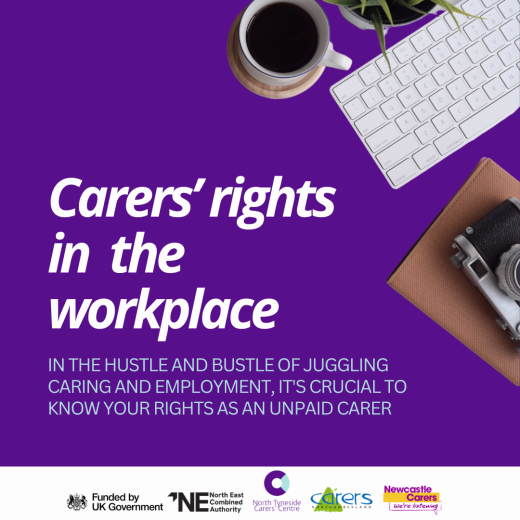Your rights as a carer in the workplace
Balancing work and caring responsibilities can be challenging, but did you know if you are a carer you have specific rights in the workplace designed to support you.
You might suddenly need time off for an urgent appointment or you may need to have flexibility in your working hours. Knowing your rights will help you feel more confident in managing your responsibilities with work.
According to Carers UK, every day 600 people leave work to care for someone and 75% of carers say juggling work and caring is a massive worry.
That’s why North Tyneside Carers’ Centre, Newcastle Carers, and Carers Northumberland are working together to deliver the Working for Carers project.
We provide friendly and specialised one-to-one support to unpaid carers aged 16 and above. If you are currently in work, or looking for employment, education, volunteering or training opportunities, our advisors are here to listen and help you.
In the meantime, here are some basic things to know about your rights when working.
The law
The key pieces of legislation that protects carers are:
- Equality Act 2010: Protects carers from discrimination based on their association with someone with a disability.
- Employment Rights Act 1996: Provides certain entitlements for time off in emergencies and the right to request flexible working arrangements.
- The Carer’s Leave Act 2023: Creates a legal right to one week’s unpaid leave a year to support the person you care for in non-emergency situations like attending medical appointments. Some employers choose to pay carers for this leave so it is worth checking..
If you’re a carer, these rights are in place to help you maintain your employment without compromising your caregiving duties.
What happens in an emergency
Employees have the right to take a “reasonable” amount of time off to handle unforeseen matters. This can include sudden illness, an accident, or arranging longer-term care. While this time is typically unpaid, it does protect your employment status. Tell your boss as soon as possible about the situation, explaining the reason for the leave and how long you expect to be absent.
Flexible working
The right to request flexible working is a game-changer for carers. This could include part-time hours, job sharing, remote work, or adjusted start and finish times.
Employees can apply for flexible working from their first day in a job. This is known as ‘making a statutory application.’
The basic steps are:
- You request the flexible working arrangements from your employer in writing.
- Your employer discusses your request with you and makes a decision on it within 2 months – or longer if agreed with you.
- If your employer agrees to the request, they must change the terms and conditions in your contract.
- If your employer disagrees, they must tell you and give the business reasons for the refusal. You may be able to complain to an employment tribunal.
Some practical tips:
- Be Specific: Include details about how the proposed changes will not disrupt your team’s workflow.
- Prepare for a discussion: Be ready to talk through your proposal and explore alternative arrangements if needed.
Employer support
Organisations are encouraged to adopt carer-friendly policies, but the level of support varies. Through the Working for Carers project, North Tyneside Carers’ Centre offers employers support in creating helpful policies. We can offer one-to-one support directly into your workplace – helping you to understand carers’ needs, recognise the range of skills they develop through looking after someone, and support carers returning to work.
Some extra things that can massively help include:
- Carer leave policies: Some jobs provide paid or unpaid carers leave beyond the statutory minimum.
- Employee assistance programmes: These provide advice and support services for carers, including counselling and referrals to external resources.
For more personalised advice and support, get in touch with us. You can find out more here.
The Working for Carers project is funded by the UK government through the UK Shared Prosperity Fund, with the North East Combined Authority as the lead authority.

